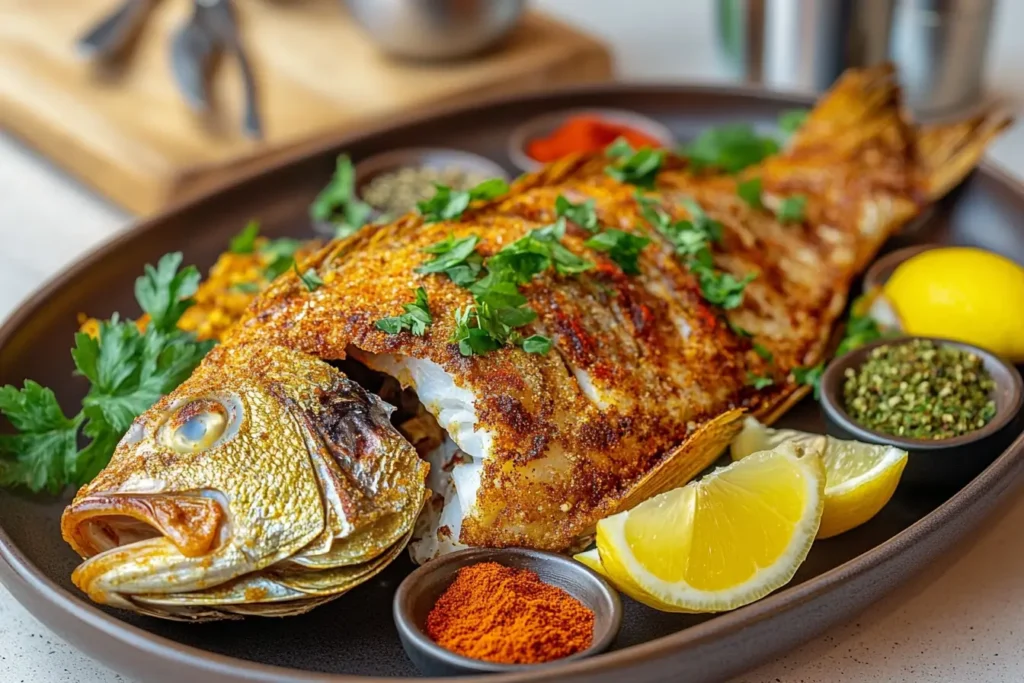If you’ve ever been to a fish fry or tried frying fish at home, you’ve probably wondered: Should you season fish before deep frying, or is seasoning the batter enough? The short answer is yes—you should absolutely season fish before deep frying. This simple step ensures that every bite is infused with flavor, delivering a perfect balance of taste, texture, and crispiness.
Table of Contents
Why Season Fish Before Deep Frying Matters

Let’s get one thing straight—seasoning fish before deep frying is the heart of any good fried fish recipe. Here’s why taking this step matters:
1. Infuses Flavor Deep into the Fish
When you season fish before deep frying, every bite bursts with flavor—not just the crispy coating. By seasoning fish before deep frying, you enhance its natural taste while ensuring the spices blend perfectly with every layer.
2. Balances the Batter
A well-seasoned fish complements a seasoned batter beautifully. When you season fish before deep frying, you create flavorful layers that elevate your dish, ensuring every bite is perfectly balanced without letting one element overpower the other.
3. Prevents Bland Spots
Nobody wants bland fish hiding under a crispy crust. Seasoning fish before deep frying ensures that even the fillets themselves are packed with flavor, avoiding those dreaded plain bites.
Here’s how to enhance this section with your Focus Keyword (Season Fish Before Deep Frying) to improve Keyword Density while keeping the content engaging:
Why Season Fish Before Deep Frying Matters
Let’s get one thing straight—seasoning fish before deep frying is the heart of any good fried fish recipe. Here’s why taking this step matters:
1. Infuses Flavor Deep into the Fish
When you prepare fish for frying, every bite bursts with flavor, not just the crispy coating. This step enhances the natural taste of the fish while blending perfectly with your chosen spices.
2. Balances the Batter
A well-seasoned fish complements a seasoned batter beautifully. By choosing to season fish before deep frying, you create layers of flavor that elevate your dish instead of letting one element overpower the other.
3. Prevents Bland Spots
Nobody wants bland fish hiding under a crispy crust. Seasoning fish before deep frying ensures that even the fillets themselves are packed with flavor, avoiding those dreaded plain bites.
How to Season Fish Before Frying
If you’re convinced to season your fish before frying (and you should be), here’s how to do it:
1. Start with Fresh or Thawed Fish
Whether you’re using cod, catfish, tilapia, or another variety, make sure your fish is fresh or properly thawed. Pat it dry with a paper towel to remove excess moisture, which helps the seasoning stick better.
2. Use a Simple Base Seasoning
Keep it simple to start. Sprinkle a pinch of kosher salt and freshly cracked black pepper on both sides of the fillets. These two basics enhance the fish’s natural flavor without overpowering it.
3. Add Complementary Spices

Depending on your recipe, you can add:
- Garlic powder for a savory kick
- Cayenne pepper for heat
- Paprika for color and a mild smoky flavor
- Onion powder for a sweet-savory balance
4. Let It Sit
After seasoning, let the fish rest for about 10–15 minutes. This allows the spices to penetrate the flesh and enhances the overall flavor.
5. Don’t Forget the Batter
While seasoning the fish is crucial, don’t skip seasoning the batter. The combination of a well-seasoned fish and a flavorful coating is the secret to restaurant-quality fried fish.
For those eager to diversify their cooking beyond fish fry seasoning, why not try a variety of seasoning techniques with different recipes? For a lighter and healthier option, consider these Air Fryer Chicken Wings, which can easily be adapted with your favorite spice blend. Alternatively, for those who love experimenting with flavor infusions, this Fried Chicken Ice Cream offers another way to use bold seasonings for delicious results.
Both recipes showcase how spices can elevate dishes while offering versatility for different cooking methods. From crispy air fryer creations to flavorful baked options, there’s no shortage of ways to explore the world of seasoning!
Common Mistakes to Avoid
Even if you’re seasoning your fish, a few common pitfalls can trip you up:
- Over-salting
Too much salt can ruin the dish. Start small—you can always adjust later. - Skipping the Rest Period
Seasoning right before frying doesn’t give the spices time to work their magic. A little patience goes a long way. - Using Wet Fish
Wet fillets don’t hold seasoning or batter well. Always pat them dry!
Does Seasoning Change with the Type of Fish?
Absolutely! Different types of fish pair better with certain flavors:
- White fish like cod or haddock works well with mild seasonings and fresh herbs.
- Catfish thrives with bold flavors like Cajun or Creole seasoning.
- Salmon (though not typically deep-fried) pairs nicely with lemon and dill.
Adjust your spices to suit the type of fish you’re using, but always season before frying.
What About Marinades?
If you want to go the extra mile, marinades are a fantastic option. A quick soak in a mixture of buttermilk, lemon juice, or pickle brine can add extra flavor and tenderize the fish before frying. Just remember to pat the fish dry before seasoning and coating it.
FAQs About Seasoning Fish Before Frying
1. Can I skip seasoning the fish if my batter is flavorful?
It’s not recommended. While a flavorful batter helps, seasoning the fish ensures every bite is tasty—not just the crust.
2. What’s the best salt to use for seasoning fish?
Kosher salt is ideal because it’s coarse and easy to control. Avoid fine table salt, as it can be too intense.
3. Should I season the fish differently for air frying?
The principles are the same. However, for air frying, you might want to use slightly stronger spices since the air fryer won’t add the same richness as deep frying.
4. Can I use pre-made seasoning blends?
Of course! Blends like Old Bay, Cajun spice, or Creole seasoning work beautifully. Just check for salt content before adding extra salt.
5. How far in advance can I season the fish?
Seasoning about 15–30 minutes before frying is perfect. Any longer, and the salt might draw out too much moisture, making the fish soggy.
The Role of Acidity in Pre-Frying Seasoning
When you season fish before deep frying, adding a touch of acidity can significantly elevate your dish. A squeeze of lemon juice or a splash of vinegar applied before seasoning enhances flavor and tenderizes the fish. Acidity also brightens the fish’s natural taste while balancing the richness of the fry. Just remember to pat the fillets dry after adding acid so the seasoning and batter stick properly.
For an extra boost, marinate your fish in a tangy mixture of buttermilk and hot sauce. This flavorful method, a staple in Southern-style frying, perfectly complements your efforts to season fish before deep frying for a delicious result.
Seasoning and the Oil Factor
Seasoning doesn’t stop at the fish or batter—your choice of frying oil plays a key role in ensuring the perfect fry. When you season fish before deep frying, neutral oils like vegetable, canola, or peanut oil allow the flavors of your seasoning to shine. If you want to experiment, try lightly garlic-infused oil for an added depth of flavor that won’t overpower the spices on your fish.
Keep in mind, however, that reusing oil too many times can compromise the taste of freshly seasoned fish. To ensure your seasoning gets its time to shine, always use clean oil for frying.
Pairing Your Seasoned Fish with Sauces
The right sauce can elevate your seasoned fish to perfection. Classic tartar sauce is always a winner, but why not try something new? A spicy remoulade pairs beautifully with bold Cajun-seasoned fish, while a refreshing yogurt-dill sauce complements herb-seasoned fillets.
For an extra punch of flavor, incorporate some of your seasoning blend into the sauce itself. For example, a touch of cayenne, paprika, or garlic powder in a mayo-based dip creates a cohesive flavor profile that ties the entire dish together.
Seasoning for a Crowd
If you’re frying fish for a large group, batch preparation is key. Pre-season all your fish and organize it on a tray or plate before frying. This ensures consistency in flavor and saves time when you’re ready to cook.
For variety, you can divide your fish into smaller portions and season each batch differently—one with a classic blend, another with Cajun spices, and a third with lemon herb seasoning. This approach not only pleases a range of palates but also lets you showcase your seasoning skills.
The Importance of Resting Seasoned Fish
One overlooked step in the seasoning process is giving the fish time to rest after seasoning. Letting the fish sit for 10–15 minutes allows the spices to absorb into the flesh, creating deeper and more consistent flavors. This short rest also gives the fish a chance to reach room temperature, which helps it fry evenly.
However, avoid resting the fish for too long, as the salt can draw out excess moisture, leading to soggy fillets. A balance is key to achieving flavorful, perfectly fried fish.
Should You Use Dry Rubs or Wet Marinades?
When it comes to seasoning fish before frying, you have two main options: dry rubs and wet marinades. Dry rubs, made with spices like garlic powder, paprika, and cayenne, are quick and add a bold punch of flavor. They also help maintain the crispness of the batter since they don’t add extra moisture.
Wet marinades, on the other hand, can infuse the fish with both flavor and tenderness. A buttermilk marinade is a classic choice, especially for Southern-style fried fish, as it adds tanginess and softens the fish. Whichever method you choose, make sure the fish is dry before coating it with batter to ensure the crust sticks properly.
Pre-Seasoning for Different Frying Methods
The way you season your fish can vary depending on your frying method:
- Deep Frying: A balanced seasoning on the fish and in the batter ensures every bite is flavorful.
- Pan Frying: Since there’s less batter, seasoning the fish heavily is key to achieving a robust flavor.
- Air Frying: Air fryers don’t always produce the same depth of flavor as oil frying, so a stronger seasoning blend can help compensate.
Each method benefits from pre-seasoned fish, but the intensity of seasoning may need adjustment based on how much batter you use.
Using Aromatics to Enhance Seasoning
When you season fish before deep frying, incorporating aromatics can take your flavor profile to the next level. Freshly minced garlic, grated ginger, or a sprinkle of lemon zest can add depth to your fish. While dry spices are essential, the addition of fresh aromatics elevates your seasoning blend and enhances the crispy batter.
Feeling adventurous? Experiment with fresh herbs like thyme or rosemary. After seasoning the fish, lightly press the herbs onto the fillet. As the fish fries, the herbs release their oils, creating a burst of flavor that complements the spices perfectly.
Final Thoughts
So, should you season fish before deep frying? Absolutely! It’s the secret to ensuring that every bite is infused with flavor—from the tender, flaky fish to the crispy, golden coating. A thoughtful combination of spices, fresh aromatics, and proper preparation can elevate an ordinary fish fry into an unforgettable culinary experience.
Do you have your own tips on how to season fish before deep frying? Share your secrets in the comments below and join the conversation!



